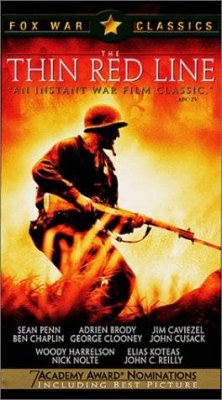Renz
An Army of One
Taking its outline from a novel by James Jones, The Thin Red Line tells the story of an Army rifle company, Charlie Co., in the chaotic, bloody battle for control of the Pacific island of Guadalcanal during World War II.
The film opens with a soldier, Pvt. Witt (Jim Caviezel), who we later discover to be a deserter from Charlie Co., playing in the surf with the children of an island village. The beginning of the film's peacefulness will be in stark contrast to later scenes of battle, violence and fragmentation. Soon, the focus shifts to a battleship where the members of Charlie Co. are preparing to make their landing on Guadalcanal. They come at the audience in a confused rush of characterization for a while, and deliberately, so it is initially hard to tell them apart.
The center of the film is an extended battle scene for control of an inland hill guarded by Japanese machine gunners. In what seems like real time, the soldiers in the company repeatedly rush the windswept hill and are beaten back. The Japanese soldiers remain distant and abstract. They become real only when they are defeated and killed.
The final third of the film is dominated by a huge fire and the revelry of the victorious Americans. Many of the men are horrified and in shock from the fighting. Eventually they regain their sense of purpose and return to the jungle to finish the cleanup operation.
Filmed with a fabulous cast, including Sean Penn, John Cusack, Nick Nolte, Elias Koteas, Ben Chaplin, Woody Harrelson, Adrien Brody and John C. Reilly, this is a film that doesn't reveal all of its secrets right away. There are many subtle references that make it very elusive.
Unfortunately, this film will always be the "other" war movie of 1998. Saving Private Ryan got much more hype and attention due to superior marketing and the name recognition of Steven Spielberg and Tom Hanks, but The Thin Red Line stands far above that film IMO.
This movie doesn't relate a story so much as it moves from image to image and mood to mood. This is a great work and I encourage anyone who has seen it to see it again. The nuances of the film are hard to grasp all in one viewing. Personally, I liked the film much better the second time I saw it, and I really enjoyed it the first time.
If you like a film that doesn't force feed everything to you, then The Thin Red Line is for you.
The film opens with a soldier, Pvt. Witt (Jim Caviezel), who we later discover to be a deserter from Charlie Co., playing in the surf with the children of an island village. The beginning of the film's peacefulness will be in stark contrast to later scenes of battle, violence and fragmentation. Soon, the focus shifts to a battleship where the members of Charlie Co. are preparing to make their landing on Guadalcanal. They come at the audience in a confused rush of characterization for a while, and deliberately, so it is initially hard to tell them apart.
The center of the film is an extended battle scene for control of an inland hill guarded by Japanese machine gunners. In what seems like real time, the soldiers in the company repeatedly rush the windswept hill and are beaten back. The Japanese soldiers remain distant and abstract. They become real only when they are defeated and killed.
The final third of the film is dominated by a huge fire and the revelry of the victorious Americans. Many of the men are horrified and in shock from the fighting. Eventually they regain their sense of purpose and return to the jungle to finish the cleanup operation.
Filmed with a fabulous cast, including Sean Penn, John Cusack, Nick Nolte, Elias Koteas, Ben Chaplin, Woody Harrelson, Adrien Brody and John C. Reilly, this is a film that doesn't reveal all of its secrets right away. There are many subtle references that make it very elusive.
Unfortunately, this film will always be the "other" war movie of 1998. Saving Private Ryan got much more hype and attention due to superior marketing and the name recognition of Steven Spielberg and Tom Hanks, but The Thin Red Line stands far above that film IMO.
This movie doesn't relate a story so much as it moves from image to image and mood to mood. This is a great work and I encourage anyone who has seen it to see it again. The nuances of the film are hard to grasp all in one viewing. Personally, I liked the film much better the second time I saw it, and I really enjoyed it the first time.
If you like a film that doesn't force feed everything to you, then The Thin Red Line is for you.



